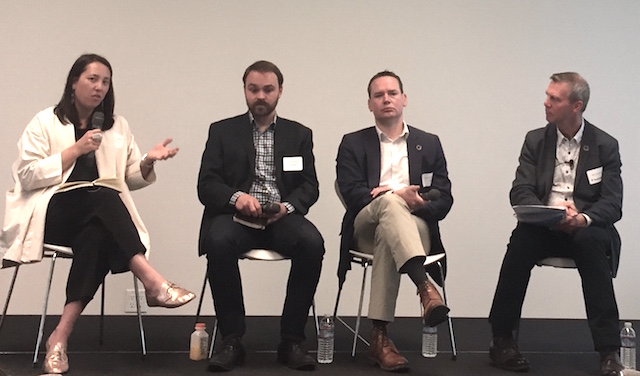SAN FRANCISCO — When the tech and development communities get together, the acronyms can make your head spin.
At a recent round table breakfast at Autodesk headquarters called “2030Vision: Harnessing Technology to Advance the Sustainable Development Goals,” people from NGOs talked SDGs, LEED, RECs, ISO 260000, iOT, AI, VR and ROIs.
The two-hour panel was headed by Rob Cameron, CEO of SustainAbility along with Dominic Vergine, head of sustainability and corporate responsibility at ARM, Ben Thompson, senior manager for sustainability at Autodesk and Erica Kochi, co-founder, UNICEF Innovation.
The UN’s Sustainable Development Goals (SDGs) were at the heart of the discussion: they’re 17 global milestones, crisscrossing to hit 169 targets covering poverty, hunger, health, education, climate change, gender equality, water, sanitation, energy, urbanization, environment and social justice. Technology plays a crucial role in reaching those goals.
Vergine and Thompson both spoke from the corporate perspective, but what about the role of open source?

UNICEF Innovation co-founder Erica Kochi says open source is “critically important,” to their projects adding that “you can work with closed-source products, but you have to have an understanding of what the goal is and if that’s going to get you there.” Also known as UNICEF Innovation labs, it’s an interdisciplinary team tasked with identifying, prototyping and scaling technologies and practices to strengthen the agency’s work for children.
Kochi says that after a decade of experience of working with governments, the agency only recommends open-source solutions. While she concedes that they sometimes use proprietary products in-house, they make a point not to procure or deploy them. “There are a couple of reasons for that. One is that we want to be sure that the government isn’t beholden to one vendor and the other is that we want to be able to take what we learn in one location and transpose it somewhere else.”
Some recent UNICEF Innovation projects include an app to help children displaced by conflict, a platform to help humanitarian and development workers manage protection-related data and a health line for fathers-to-be. Startups in program countries can also pitch their open-source projects to the UNICEF Innovation Fund.
For their work in Kosovo, Uganda and Zimbabwe, UNICEF Innovation Labs were honored in 2012 by Red Hat as one of the top four global open-source projects.
You can hear more from Kochi at the Red Hat Summit May 9 in San Francisco where she’ll be speaking about “Ideas worth exploring.”
- OpenStack Homebrew Club: Meet the sausage cloud - July 31, 2019
- Building a virtuous circle with open infrastructure: Inclusive, global, adaptable - July 30, 2019
- Using Istio’s Mixer for network request caching: What’s next - July 22, 2019

)







